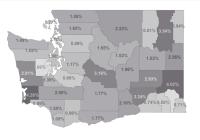The end of an academic year is often bittersweet: there are many accomplishments to celebrate, but there also are many goodbyes as graduating students head off on the exciting next leg of their individual journeys. This year, my last as chair of the UW Sociology department, is certainly bittersweet for me. But as everyone who knows me knows, I prefer to focus on the positive, so in this, my last “Letter from the Chair,” I will share with you some high points of the year. Just last week, we celebrated our first in-person graduation in three years, a joyous evening recognizing the perseverance of 242 undergraduates who completed their degrees during this long pandemic year. You can meet some of these remarkable students in our Voices of Sociology video.
As we slowly emerged from our pandemic cocoons, we watched with admiration as our three new faculty colleagues and a terrific cohort of new graduate students found their stride here at UW. Together with our students we returned from quiet and isolation with renewed energy: conducting research, giving talks, publishing papers and books, and teaching classes. As you will see in our featured stories, many refocused our work in response to the pandemic, our racial reckoning, and our unsettled times. Our renewed zeal in work felt all the sweeter because we worked together in the same space, collaborating without the mediation of a Zoom room or Slack chat.
It was certainly not all ‘business as usual’ though. Several members of our faculty were honored with major awards this year, including Adrian Raftery who was named a Chaire d’Excellence at the University of Paris, Zack Almquist, who won a CAREER award from NSF, and Theresa Rocha Beardall who is the recipient of the 2022 ASA Section on Racial and Ethnic Minorities' Distinguished Early Career Award. Theresa will also spend next year as a fellow at the Notre Dame Institute for Advanced Study. Other faculty received new grants, including Jelani Ince who received an Early Career Pipeline Grant from the Russell Sage Foundation, and Magda Boutros who was selected for funding by the University’s Royalty Research Fund. Nathalie Williams is leading an interdisciplinary team (including several colleagues from the department) to create a new Puget Sound Survey, a long-term panel survey of the Puget Sound region that will provide high quality data in support of causal academic research and evidence-based policy making.
And finally, this spring we also say farewell to our colleague Pepper Schwartz, who is retiring after fifty years on the UW faculty. Pepper sat down recently for a conversation with Ulrika O’Brien, and I hope you’ll enjoy learning more about her fascinating career in the resulting article.
As we bring yet another strange and challenging year to a close, I want to express what an honor and privilege it has been for me to chair this department for the past five years. I hope receiving these little glimpses into our life here has helped you feel connected to UW Sociology, and I invite you to share your own news of successes and life changes. Your support makes much of what we do possible.
Katherine Stovel
Professor and Chair
Congratulations, 2022 Sociology Graduates!
It's been an honor and a pleasure to see all that you have accomplished during your time at UW. We are fortunate to know so many sociological thinkers, and we know that you will have a positive impact on your communities. We hope you stay in touch with us! Please let us know what you're to!
We invite you to watch the latest Voices of Sociology video and learn why sociology matters to some of our graduates.
[VOS video thumbnail]
Publicly Engaged Sociologists
Kate O’Neill, Alexes Harris, and Ian Kennedy authored a Sunday op-ed in The Seattle Times. This op-ed was attached to a bill which, if passed, would begin the process of reducing monetary sanctions.
Mark Igra and Nora Kenworthy were featured in a long segment on NPR’s Science Friday, discussing their research on crowdfunding medical expenses.
Jelani Ince’s research is referenced in a KNKX article about the impact of racial justice protests on public discourse.
Awards and Accomplishments
Jelani Ince has been awarded a Pipeline Grant from the Russell Sage Foundation. The grant goes to support his ongoing work that explores how Black Lives Matter protests helped shift public discourse toward the movement’s agenda and reframed how people understand systemic, racialized police violence.
Theresa Rocha Beardall has accepted a fellowship at Notre Dame’s Institute for Advanced Study for the 2022-23 academic year. During her fellowship year, Rocha Beardall will focus on her research on tribal governance, sovereignty, and policing, and will contribute to the NDIAS’s collective study of The Public, as well as writing “Transactional Policing and the Political Economy of Public Safety.” Theresa has also won the 2022 Distinguished Early Career Award from the American Sociological Association’s Section on Race and Ethnic Minorities. This award recognizes exceptional achievement and scholarly contribution to research on the sociology of race and ethnicity, and Theresa joins an eminent group of sociologists who have previously won this award.
Adrian Raftery has been named the 2022 winner of the The Mindel C. Sheps Award. Jointly sponsored by PAA and the University of North Carolina School of Public Health, this award is given biennially for foundational contributions to mathematical demography or demographic methodology. Adrian was honored for his work on population projects, and joins an exceptionally distinguished list of past winners of this prize. You can watch a video of the award announcement and Adrian’s acceptance here.
Pat Louie’s article, Revisiting the Cost of Skin Color: Discrimination, Mastery, and Mental Health among Black Adolescents is among the top ten most downloaded articles in 2021 in the Society and Mental Health, an ASA journal.
Zack Almquist has received a Faculty Early Career Development (CAREER) award from the National Science Foundation (NSF) for his project, "Measuring and Modeling the Multi-Modal Networks and Demographics of People Experiencing Homelessness.” NSF’s CAREER award program supports early-career faculty who have the potential to serve as academic role models in research and education and to lead advances in their field. Zack’s award will provide funding to support his efforts to integrate recent developments in survey sampling and estimation (e.g. respondent driven sampling or network scale-up methods) with information from online and offline sources about people's experience while homeless in order to obtain population counts, demographic rates, and social network information.
2022 Departmental Student Awards
- Woolston Award for Academic Excellence: Hana Brown
- Al Black Award for Community Service: Sára Mustre-del Rio
- Best Performance in the Master’s Degree: June Yang for her thesis "Mate Selection Power and Female Marital Mortality Differential in China during Transition."
- Herbert L Costner Award: Selen Güler, "The Good, the Bad, and the Taxed: How People Judge Soda Consumers Across Health-Related Situations."
Transitions
Where are our 2021-22 PhD graduates?
After a postdoc at Rice University, Ian Kennedy will be joining University of Illinois as an assistant professor at University of Illinois-Chicago. Christina Hughes has accepted an assistant professorship at Macalester College. Aliyah Turner has accepted an assistant professorship at DePauw University. Daiki Hiramori will be joining the Department of Global and Interdisciplinary Studies at Hosei University in Tokyo as an assistant professor. Kate O’Niell will be doing postdoctoral research with Professor Alexes Harris here at UW.
Alumni News
- We recently got a nice note from Roy Rickson (PhD 1969). Roy and his wife Sally (Sara Tufts) Rickson (PhD 1977) both had long and interesting careers at Griffith University in Queensland Australia. Even after moving down under, Roy continued to work with UW Professor Ed Gross on several projects on the dynamics of interdisciplinarity, and Gross helped considerably in an ongoing study of industry/community relations in the cement industry, with fieldwork in Switzerland, Queensland and Thailand. Though now retired, Roy is still publishing in these areas and Sally is still co-supervising PhD students.
- April Fernandes (PhD 2015) is an Assistant Professor at North Carolina State University where she continues to study the effects of incarceration on incarcerated individuals. Earlier this spring, she and another alumna, Katrina Leupp (PhD 2014), now at Washington State University Vancouver), presented at the Population Association of America conference on their research about the physical and mental health impacts of police contact for Black women.
- Maggie Yuse (2015 BA) completed her MPA with a focus on environmental policy in December 2021. This spring, she began a new role, working toward a zero waste Seattle as Government Relations and Legislative Affairs Advisor for Seattle Public Utilities.
- UW’s new director of Tribal Relations, Sherri Berdine (BA Sociology 2008), was a Sociology major at UW. Read more about her here.
- Lanu Kim (2018 PhD) is now an assistant professor in the School of Humanities and Social Sciences and in the school of computing at the Korea Advanced Institute of Science and Technology (KAIST). After finishing her PhD Lanu was a postdoctoral fellow and data science scholar at Stanford University.
- Charles Lafear (2021 PhD) will begin a new position as an assistant professor at Cambridge's Institute of Criminology this fall. Since graduating last summer Chuck has been a postdoc in the Centre for Social Investigation at Nuffield College (Oxford). As Chuck put it in an email, "It is bittersweet to leave Nuffield so quickly,... but Cambridge IoC is probably the best criminology department in the world. What a wild ride the last couple years have been.”
- Charis Kubrin (2000 PhD), who is now a Professor of Criminology at University of California Irvine, has been keeping busy with several research projects, including challenging perceptions about immigration and crime as well as examining the impact of prison downsizing on public safety in California.
- In March, Jason Wollschleger (PhD 2011) guided his students at Whitworth University (most of them from the Northwest) on a historical tour through the South as part of a Sociology course on race in America. The stops were places marked by violence and resistance during the slave trade, Jim Crow, and the Civil Rights era. The tour, along with student reflections, was featured in the Seattle Times.
- Erin Carll (PhD 2021) has been recognized as one of five Journal of Engineering Education Star Reviewers for 2021. Since 2017, JEE has been giving the Star Reviewer Award to recognize the hard work of top peer reviewers, considering the number of reviews completed, recommendations by the Associate Editors, and the content and constructive nature of the reviews.
Send your alumni news to uwsoc@uw.edu.
Follow us on social media
We are on Twitter! Follow us for more regular news about UW Sociology.
Support our students, program, and UW:
- Support UW Sociology with a gift to Friends of Sociology Fund, the single most important resource for the department. Gifts to this unrestricted fund advance our areas of highest need
- Contact us at uwsoc@uw.edu if you would like to discuss more targeted giving to support our students or research activities
Any gift — large or small — is greatly appreciated.



